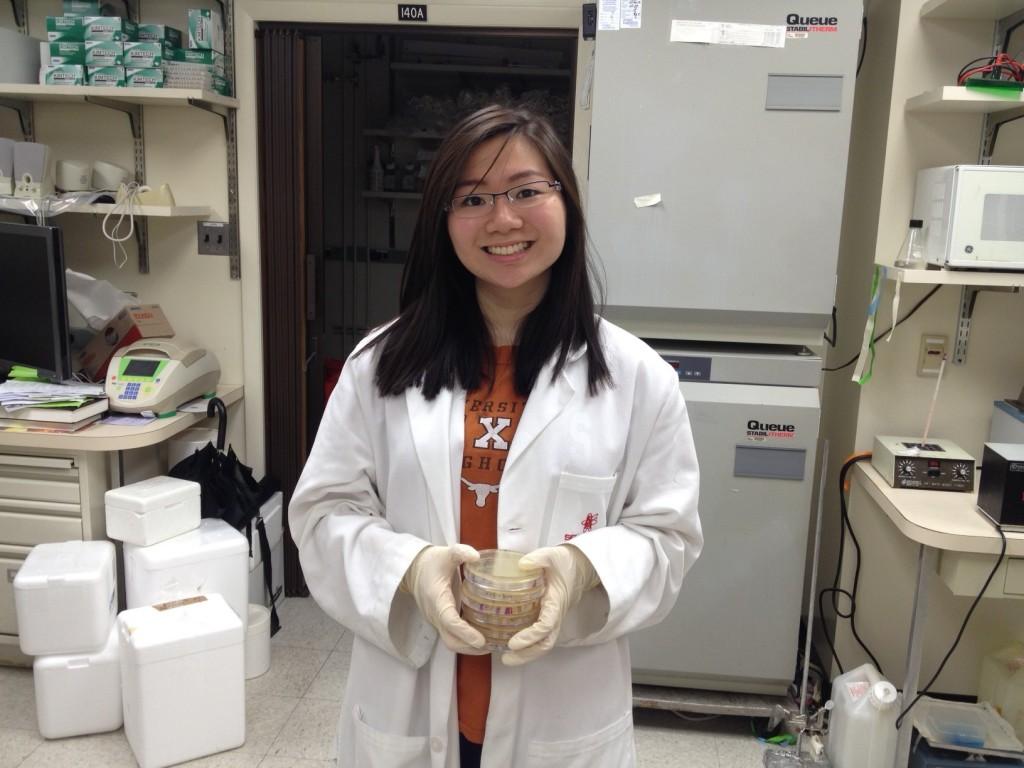Summer interns continue projects through mentorship
Senior Tina Ju is working at the National Cancer Institute (NCI) of the National Institutes of Health (NIH). Photo courtesy of Tina Ju.
October 2, 2013
As students settle into the familiar routine of school, many seniors have just formulated outlines for their senior research projects and are now in the process of collecting data. However, several students involved in the mentorship program are already miles ahead with a summer of intense research already under their belts.
Mentorship is an experience unique to Jefferson in which students have the option of pursuing their research interests outside of school. It can be chosen in lieu of conducting a project within the 13 research labs at Jefferson.
“Mentorship is an alternative way for students to fulfill their senior tech lab requirement,” Mentorship Program Coordinator Matthew Pearce said. “The aim is to give them real life research oriented experience by working together with technical professionals and their dedicated resources. These professionals have made their career through conducting research, and so can offer a realistic insight.”
This year, 52 seniors are participating in the mentorship program. This number fluctuates from year to year, with Biotechnology and Life Sciences, Neuroscience and Computer Systems consistently ranking as the most popular of the labs.
According to Pearce, summer internships are the preferred way to segue into school-year mentorships. Seniors who choose to work with their mentors over the summer have additional time to learn, prepare, and do research for their projects. Due to this early start, these seniors are well into the analytical and experimental phases of their projects by the start of the school year, rather than in the initial developmental stage.
Senior Tina Ju is a prime example of a student who took advantage of the summer to kick off her projects. Ju is currently working under the guidance of researchers Dr. Dimiter S. Dimitrov and Dr. Tianlei Ying at the National Cancer Institute (NCI) of the National Institutes of Health (NIH).
Ju chose to participate in mentorship because of the freedom and autonomy it provides.
“I really appreciate having the chance to learn new things every day from experts in my field,” Ju said. “I enjoy being in a room full of people smarter than me who are more than happy to provide advice and guidance.”
Ju’s project involves the discovery of novel human antibodies that can be used against the emerging viruses influenza H7N9 and MERS-CoV. Dimitrov’s lab previously discovered the first human antibodies against other emerging viruses such as the Hendra and Nipah viruses, which were administered on a compassionate basis to exposed humans.
Ju is also working on an idea for engineered proteins for therapy against such viruses. She has submitted her project to the Siemens Competition.
“I definitely plan to further test and develop the engineered proteins I’ve been working on this summer,” Ju said.
Students had a variety of options in which they could choose their labs. Ju was nominated and selected for the ORWH-NIH-FAES Summer Research Program for High School Students and subsequently chose to work in Dimitrov’s lab due to her interests in computational biology, nanobiology and protein engineering.
Other students found their niches through Jefferson’s placement program. One of Pearce’s main responsibilities is to match up students with labs best suited to their interests. This also involves communicating program expectations to potential mentors.
“It is fairly important that the mentors understand these are not just regular internships,” Pearce said. “There is a difference between a real research experience and simply assisting a mentor to do routine tasks.”
Although the mentorship projects are completed off-campus and for the most part independent from Jefferson, they are still affiliated with a specific lab to fulfill the course requirement. As a result, students are able to reach out to potential mentors after narrowing down their focus to one of the 13 senior research laboratories that Jefferson has to offer.
Senior Snigdha Srivastava took this route after she selected the neuroscience field. After receiving contact information from Pearce, she set up an interview with her mentor, Dr. Masaaki Torii of the Children’s National Medical Center’s Neuroscience Research Lab.
“I thought it was a great opportunity to further my education and contribute to the scientific community with a project that could really make a difference,” Srivastava said. “I think the benefits are tremendous – in a professional lab setting, I get to see some of the cutting-edge work that we hear of in science journals and participate in some of this cutting-edge work as well.”
Srivastava’s project involves using immunohistochemistry and confocal microscopy to track specific neuronal subtypes of the brains of normal mice and mice that have a mutated gene that may be linked to autism. Through collaborating with a team in Japan, Srivastava hopes to collect data that will show how the spatial columnar pattern of different types of neurons changes due to this mutation.
By far the largest issue that students face is transportation to their research labs, many of which are located as far away as Washington, D.C. or Bethesda, MD. To circumvent the issue of having insufficient time in the lab, Srivastava and many other seniors are taking a new approach: enrolling in an online course for their fifth period classes.
Another student, senior Matt Wattendorf, connected with his mentor, Dr. Joe Parker of the Naval Research Laboratories, without assistance from the school. Parker’s boss offered him the mentorship opportunity when Wattendorf visited with his older brother.
After a few weeks of taking safety courses and orienting himself in the lab, Wattendorf began work on his project, which involves developing a battery using nanofoam materials that is durable enough to replace the lithium-ion battery.
“I think the biggest benefits are: you see what a day in the life of a scientist entails, what it takes to succeed as a scientist, and what kinds of people you’ll be working with if you choose to enter the research field,” Wattendorf said.
While mentorship typically lasts for one semester, several students with more promising projects in the first semester will extend their projects into the rest of the year.
“I’m seriously considering year-long mentorship, so I might be able to pursue more in-depth projects than if I just worked for one semester,” Ju said.






